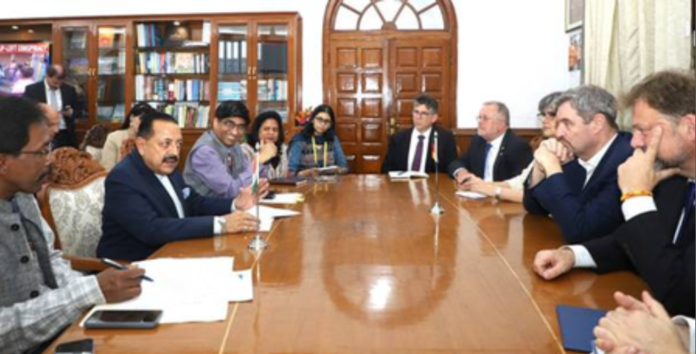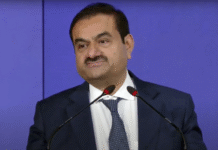New Delhi–India and Germany on Sunday reaffirmed their commitment to deepening bilateral cooperation in science, technology, and innovation during a high-level meeting between Union Minister Dr. Jitendra Singh and Markus Söder, Minister-President of the German state of Bavaria.
The meeting included a one-on-one discussion between the two leaders, followed by delegation-level talks led by both ministers.
Welcoming the German delegation, Dr. Singh highlighted key areas of potential collaboration, including Artificial Intelligence, Quantum Technologies, Biotechnology, Clean Energy, Electric Mobility, Cyber-Physical Systems, and Green Hydrogen.
“India has embarked on mission-mode programmes under the visionary leadership of Prime Minister Narendra Modi. We seek economic and sustainable solutions through scientific and technological interventions, and Germany is a natural partner in this endeavour,” said Dr. Singh, Minister of State (Independent Charge) for Science and Technology.
He lauded the Indo-German 2+2 collaboration model—bringing together academia and industry from both countries—as a groundbreaking initiative for building innovation-driven ecosystems.
“The 2+2 model is futuristic. It enables joint innovation, co-development, and commercialization by uniting universities and industries from both sides to tackle global challenges,” he noted.
Dr. Singh emphasized India’s rapid progress in the biotechnology sector, now home to over 3,000 startups, and the country’s standing as the world’s largest vaccine manufacturer. He also spotlighted the newly introduced BIOe3 policy, which focuses on Energy, Economy, and Employment as the pillars of biotech-led growth.
Further, he pointed to new opportunities in India’s Space-Tech and Nuclear sectors, now open to private participation, as well as the country’s robust startup ecosystem—ranking third globally in terms of startups and unicorns.
“India’s academic outreach to Germany is growing steadily, with over 50,000 Indian students currently enrolled in German universities, primarily in STEM fields. This number has tripled over the past seven years,” Dr. Singh said.
He encouraged a reciprocal exchange, urging more German students to pursue studies in India, particularly in Oriental Studies, Indian Culture, and Traditional Knowledge Systems.
“Germany has become a preferred academic destination for Indian youth. We now hope to see more German students engage with India’s rich intellectual and scientific heritage,” he added.
The German delegation included Dr. Markus Söder, Dr. Philipp Ackermann, German Ambassador to India, and other senior officials. The Indian side was represented by Dr. Abhay Karandikar, Secretary, Department of Science and Technology (DST); Dr. Praveen Somasundaram, Head of International Cooperation; and Dr. Alka Sharma, Senior Advisor, Department of Biotechnology. (Source: IANS)







